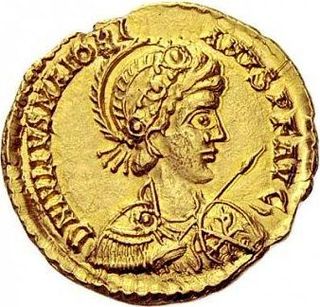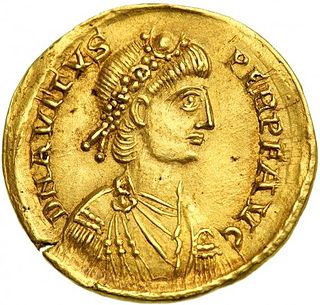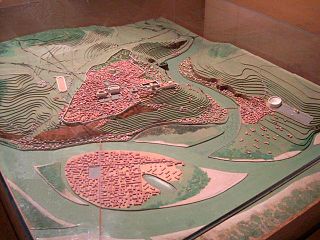
The Burgundians were an early Germanic tribe or group of tribes. They appeared in the middle Rhine region, near the Roman Empire, and were later moved into the empire, in eastern Gaul. They were possibly mentioned much earlier in the time of the Roman Empire as living in part of the region of Germania that is now part of Poland.

Ricimer was a Romanized Germanic general who effectively ruled the remaining territory of the Western Roman Empire from 456 after defeating Avitus, until his death in 472, with a brief interlude in which he contested power with Anthemius. Deriving his power from his position as magister militum of the Western Empire, Ricimer exercised political control through a series of puppet emperors. Ricimer's death led to unrest across Italy and the establishment of a Germanic kingdom on the Italian Peninsula.

Majorian was the Western Roman emperor from 457 to 461. A prominent commander in the Western military, Majorian deposed Avitus in 457 with the aid of his ally Ricimer at the Battle of Placentia. Possessing little more than Italy, Dalmatia, as well as some territory in Hispania and northern Gaul, Majorian campaigned rigorously for three years against the Empire's enemies. In 461, he was murdered at Dertona in a conspiracy, and his successors until the Fall of the Empire in 476 were puppets either of barbarian generals or the Eastern Roman court.

Flavius Aetius was a Roman general and statesman of the closing period of the Western Roman Empire. He was a military commander and the most influential man in the Empire for two decades (433–454). He managed policy in regard to the attacks of barbarian federates settled throughout the West. Notably, he mustered a large Roman and allied (foederati) army in the Battle of the Catalaunian Plains, ending a devastating invasion of Gaul by Attila in 451, though the Hun and his subjugated allies still managed to invade Italy the following year, an incursion best remembered for the ruthless Sack of Aquileia and the intercession of Pope Leo I.

Procopius Anthemius was the Western Roman emperor from 467 to 472. Born in the Eastern Roman Empire, Anthemius quickly worked his way up the ranks. He married into the Theodosian dynasty through Marcia Euphemia, daughter of Eastern emperor Marcian. He soon received a significant number of promotions to various posts, and was presumed to be Marcian's planned successor. However, Marcian's sudden death in 457, together with that of Western emperor Avitus, left the imperial succession in the hands of Aspar, who instead appointed Leo, a low-ranking officer, to the Eastern throne, probably out of fear that Anthemius would be too independent. Eventually, this same Leo designated Anthemius as Western emperor in 467, following a two-year interregnum that started in November 465.

Eparchius Avitus was Roman emperor of the Western Empire from July 455 to October 456. He was a senator of Gallic extraction and a high-ranking officer both in the civil and military administration, as well as Bishop of Piacenza.

Gaius Sollius Modestus Apollinaris Sidonius, better known as Sidonius Apollinaris, was a poet, diplomat, and bishop. Born into the Gallo-Roman aristocracy, he was son-in-law to Emperor Avitus and was appointed Urban prefect of Rome by Emperor Anthemius in 468. In 469 he was appointed Bishop of Clermont and he led the defence of the city from Euric, King of the Visigoths, from 473 to 475. He retained his position as bishop after the city's conquest, until his death in the 480s. He is venerated as a saint in the Catholic church, the Orthodox Church, and the True Orthodox Church, with his feast day on 21 August.

Alcimus EcdiciusAvitus was a Latin poet and bishop of Vienne in Gaul. His fame rests in part on his poetry, but also on the role he played as secretary for the Burgundian kings.

Lugdunum was an important Roman city in Gaul, established on the current site of Lyon. The Roman city was founded in 43 BC by Lucius Munatius Plancus, but continued an existing Gallic settlement with a likely population of several thousands. It served as the capital of the Roman province of Gallia Lugdunensis and was an important city in the western half of the Roman Empire for centuries. Two emperors, Claudius and Caracalla, were born in Lugdunum. In the period 69–192 AD, the city's population may have numbered 50,000 to 100,000, and possibly up to 200,000 inhabitants.

Tao Yuanming, also known as Tao Qian, was a Chinese poet and politician who was one of the best-known poets during the Six Dynasties period. He was born during the Eastern Jin dynasty (317–420) and died during the Liu Song (420–479) dynasty. Tao Yuanming spent much of his life in reclusion, living in the countryside, farming, reading, drinking wine, receiving the occasional guest, and writing poems in which he often reflected on the pleasures and difficulties of life, as well as his decision to withdraw from civil service. Tao's simple and direct style was somewhat at odds with the norms for literary writing in his time. In the Tang dynasty (618–907), he was well known as a recluse. During the Northern Song dynasty (960–1127), influential literati figures such as Su Shi (1037–1101) declared him a paragon of authenticity and spontaneity in poetry, predicting that Tao Yuanming would achieve lasting literary fame. However, Tao Yuanming's inclusion in the 6th century literary anthology Wen Xuan argues for at least a beginning of fame in his own era, at least in his own birth area. Tao Yuanming would later be regarded as the foremost representative of what we now know as Fields and Gardens poetry. Tao Yuanming found inspiration in the beauty and serenity of the natural world close at hand. Tao Yuanming is depicted in the Wu Shuang Pu by Jin Guliang.
Magnus Felix Ennodius was Bishop of Pavia in 514, and a Latin rhetorician and poet.

Eucherius was a high-born and high-ranking ecclesiastic in the Christian church in Roman Gaul. He is remembered for his letters advocating extreme self-abnegation. From 439, he served as Archbishop of Lyon, and Henry Wace ranked him "the most distinguished occupant of that see" after Irenaeus. He is venerated as a saint within the Catholic Church and Eastern Orthodox Church.

Perpetuus was the sixth Bishop of Tours, serving from 460 to 490.
Ruricius I was a Gallo-Roman aristocrat and bishop of Limoges from c. 485 to 510. He is one of the writers whose letters survive from late Roman Gaul, depicting the influence of the Visigoths on the Roman lifestyle. He should not be confused with his son-in-law, Saint Rusticus.
Saint Rusticus, the successor of Saint Lupicinus of Lyon (491-494), served as Archbishop of Lyon from 494 to April 501. Later canonized and venerated in the Catholic Church, his feast day is 25 April.

Lyon is a city in the southeast of France. The area has been inhabited since prehistoric times and was one of the most important cities of the Roman Empire, Lugdunum. After the Battle of Lugdunum (197) the city never fully recovered, and Lyon was built out of its ashes becoming a part of the Kingdom of the Burgundians.
Six Dynasties poetry refers to those types or styles of poetry particularly associated with the Six Dynasties era of China. This poetry reflects one of the poetry world's more important flowerings, as well as being a unique period in Classical Chinese poetry, which, over this time period, developed a poetry with special emphasis on romantic love, gender roles, and human relationships. The Six Dynasties era is sometimes known as the "Age of Fragmentation", because China as a whole through this period lacked unification as a state, at least for any extended period of time; and, instead, many states rose and fell, often overlapping in existence with other states. Which of the various states and dynasties constituted the "6" dynasties of the Six Dynasties period varies somewhat according to which of the traditional selection criteria are chosen. The Six Dynasties era covers several somewhat overlapping main periods including all of the following: the Three Kingdoms (220–280), Jin dynasty, the Sixteen Kingdoms, and the Southern and Northern Dynasties (420–589). Sometimes, chronological discrepancies occur in regard to the turbulent political events of the time, from which these traditional historical-era designations derive, together with the somewhat different chronology of poetic developments. Thus, neither the lives of the poets nor the trends in their poetry fit gently and neatly together with these period dates. Furthermore, conversions to the Common Era dating system can create further complications. However, regardless of the chronological difficulties, major developments of poetry during the Six Dynasties include formalizing the distinction between the Jian'an era regular yuefu and the shi style poetry, further development of the fu, theoretical work on technique, and the preservation of both Six Dynasties and earlier poetry by collecting and publishing many of the pieces which survive today into various anthologies consisting all or in part of poetry.












